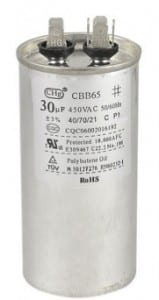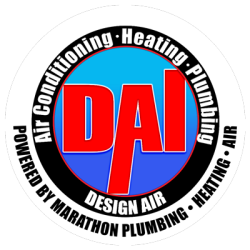The design of modern air conditioners maximizes reliability, but hot summers can strain some of its vital parts over time. In fact, if you suddenly find your air conditioner failing to run, its capacitor may be the first place you want to investigate. These small but vital components will render your air conditioner useless if they malfunction.
What is a Capacitor? 
A capacitor works in a similar way to a battery. In fact, they even resemble them. The main difference is that a battery can generate electrons while a capacitor only stores them. However, why does your air conditioner need a battery-like component when it’s directly plugged into an electrical source? Good question! The answer is that your A/C system actually requires more energy to start than is available in a normal electrical wiring system. Therefore, air conditioners utilize a capacitor to produce an added charge to supplement the power drawn from an electrical grid. An air conditioner may use several capacitors. For instance, an A/C’s indoor and outdoor fan motors often use capacitors. Yet, it is the capacitor of the compressor motor that is the most likely to fail.
Why Your Capacitors Are Breaking Bad
Capacitors handle demanding functions. Every time an air conditioner cycles on and off, the capacitor goes to work—not to mention this is performed in high temperatures. Heat, voltage capacity, and age are the common factors that result in capacitor failure.
Are you having problems with your air conditioner? Has it stopped starting? Give us a call and we’ll come by to take a look at it. We handle A/C problems like capacitor failures, broken compressors and a host of others.

